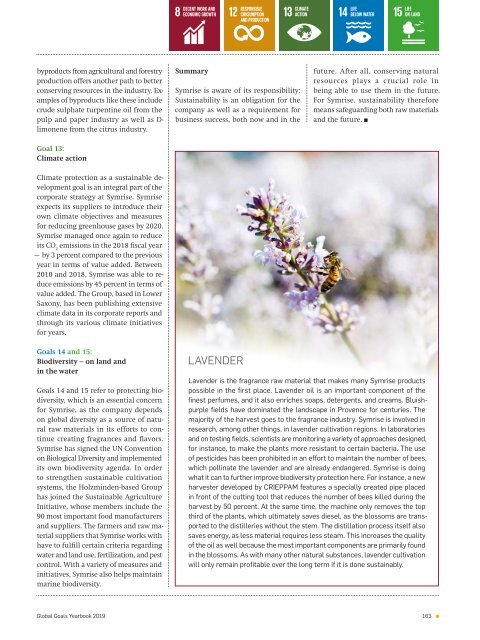Aliging Profit with Purpose - Global Goals Yearbook 2019
What are companies for? The rules for companies have changed. The focus is increasingly on their sustainable, social, and ecological impacts. The strategic orientation toward the so-called corporate purpose is decisive for profitable growth in the future. This currently results in a large number of questions for businesses: How do you find an inspiring and future-oriented corporate purpose, and how can it be aligned in such a way that it brings profitable growth and social responsibility in concert? The new 2019 edition of the Global Goals Yearbook offers answers to these crucial questions thanks to its consistent orientation toward the UN Sustainable Development Goals and a competent editorial board and author pool.
What are companies for? The rules for companies have changed. The focus is increasingly on their sustainable, social, and ecological impacts. The strategic orientation toward the so-called corporate purpose is decisive for profitable growth in the future.
This currently results in a large number of questions for businesses: How do you find an inspiring and future-oriented corporate purpose, and how can it be aligned in such a way that it brings profitable growth and social responsibility in concert? The new 2019 edition of the Global Goals Yearbook offers answers to these crucial questions thanks to its consistent orientation toward the UN Sustainable Development Goals and a competent editorial board and author pool.
Create successful ePaper yourself
Turn your PDF publications into a flip-book with our unique Google optimized e-Paper software.
yproducts from agricultural and forestry<br />
production offers another path to better<br />
conserving resources in the industry. Examples<br />
of byproducts like these include<br />
crude sulphate turpentine oil from the<br />
pulp and paper industry as well as D-<br />
limonene from the citrus industry.<br />
Summary<br />
Symrise is aware of its responsibility:<br />
Sustainability is an obligation for the<br />
company as well as a requirement for<br />
business success, both now and in the<br />
future. After all, conserving natural<br />
resources plays a crucial role in<br />
being able to use them in the future.<br />
For Symrise, sustainability therefore<br />
means safeguarding both raw materials<br />
and the future.<br />
Goal 13:<br />
Climate action<br />
Climate protection as a sustainable development<br />
goal is an integral part of the<br />
corporate strategy at Symrise. Symrise<br />
expects its suppliers to introduce their<br />
own climate objectives and measures<br />
for reducing greenhouse gases by 2020.<br />
Symrise managed once again to reduce<br />
its CO 2<br />
emissions in the 2018 fiscal year<br />
– by 3 percent compared to the previous<br />
year in terms of value added. Between<br />
2010 and 2018, Symrise was able to reduce<br />
emissions by 45 percent in terms of<br />
value added. The Group, based in Lower<br />
Saxony, has been publishing extensive<br />
climate data in its corporate reports and<br />
through its various climate initiatives<br />
for years.<br />
<strong>Goals</strong> 14 and 15:<br />
Biodiversity – on land and<br />
in the water<br />
<strong>Goals</strong> 14 and 15 refer to protecting biodiversity,<br />
which is an essential concern<br />
for Symrise, as the company depends<br />
on global diversity as a source of natural<br />
raw materials in its efforts to continue<br />
creating fragrances and flavors.<br />
Symrise has signed the UN Convention<br />
on Biological Diversity and implemented<br />
its own biodiversity agenda. In order<br />
to strengthen sustainable cultivation<br />
systems, the Holzminden-based Group<br />
has joined the Sustainable Agriculture<br />
Initiative, whose members include the<br />
90 most important food manufacturers<br />
and suppliers. The farmers and raw material<br />
suppliers that Symrise works <strong>with</strong><br />
have to fulfill certain criteria regarding<br />
water and land use, fertilization, and pest<br />
control. With a variety of measures and<br />
initiatives, Symrise also helps maintain<br />
marine biodiversity.<br />
LAVENDER<br />
Lavender is the fragrance raw material that makes many Symrise products<br />
possible in the first place. Lavender oil is an important component of the<br />
finest perfumes, and it also enriches soaps, detergents, and creams. Bluishpurple<br />
fields have dominated the landscape in Provence for centuries. The<br />
majority of the harvest goes to the fragrance industry. Symrise is involved in<br />
research, among other things, in lavender cultivation regions. In laboratories<br />
and on testing fields, scientists are monitoring a variety of approaches designed,<br />
for instance, to make the plants more resistant to certain bacteria. The use<br />
of pesticides has been prohibited in an effort to maintain the number of bees,<br />
which pollinate the lavender and are already endangered. Symrise is doing<br />
what it can to further improve biodiversity protection here. For instance, a new<br />
harvester developed by CRIEPPAM features a specially created pipe placed<br />
in front of the cutting tool that reduces the number of bees killed during the<br />
harvest by 50 percent. At the same time, the machine only removes the top<br />
third of the plants, which ultimately saves diesel, as the blossoms are transported<br />
to the distilleries <strong>with</strong>out the stem. The distillation process itself also<br />
saves energy, as less material requires less steam. This increases the quality<br />
of the oil as well because the most important components are primarily found<br />
in the blossoms. As <strong>with</strong> many other natural substances, lavender cultivation<br />
will only remain profitable over the long term if it is done sustainably.<br />
<strong>Global</strong> <strong>Goals</strong> <strong>Yearbook</strong> <strong>2019</strong> 163

















